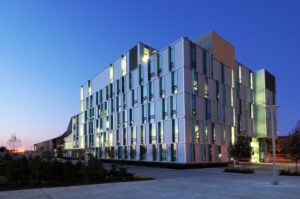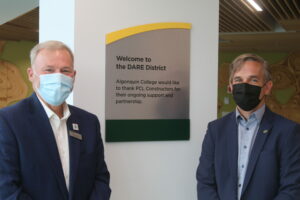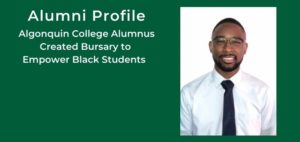 Tuesday morning started bright and early for the folks gathered around their computer screens to kick off celebrations for the Algonquin Centre for Construction Excellence (ACCE), which turns 10 this year.
Tuesday morning started bright and early for the folks gathered around their computer screens to kick off celebrations for the Algonquin Centre for Construction Excellence (ACCE), which turns 10 this year.
The virtual breakfast was a thank you to the industry leaders who have donated and supported the ACCE vision since its inception, a celebration of the landmark building and all it represents, and a glimpse of its future.
Chris Hahn, Dean of ACCE and the Perth Campus, acted as the event’s host.
“In this 10th anniversary year, we want to build on what we think is the excellent reputation of the Algonquin Centre for Construction Excellence,” he said, noting how amazing it was to watch the centre being built a decade ago and how far it had come.
During the breakfast, attendees heard from industry leaders, Algonquin students and alumni, and members of the Algonquin Executive Team about what ACCE means to them.
John DeVries, President of the Ottawa Construction Association, spoke about the joint vision of the College and industry to bring all the trades together with designers and project management under one roof, and how ACCE has succeeded at doing just that.
DeVries said the construction industry feels like a part of that success: “We really feel we’re tied to Algonquin.”
Steve Barkhouse, President of Amsted Design-Build, and a board member at the College who helped fundraise for the construction of ACCE, spoke about how the building was a symbol of what Algonquin wanted to do for the trades as a whole. He described the old trades building at Algonquin as run down and set back on campus, an analogy for how the trades were once sometimes viewed as a second-class, second-choice career. The new building—with its award-winning design, LEED-platinum certification, and prominent position—made the statement that trades were a first-class, first-choice career, which is precisely the message the College and its partners wanted to send.
Barkhouse also outlined the challenges the trades now face due to a shortage in workers, stating that Algonquin grads “are the leaders of the future.”
Current student Elisa Matte, as well as graduates Ikechukwu Njoku and Jaidyn Brown, also attended the breakfast to share their experiences studying in ACCE.
Matte, who studied in the culinary program at Algonquin in the ’90s and had now returned to do the Heating, Refrigeration and Air Conditioning Technician Program, called the ACCE space “unique and inspiring.”
“Being a woman re-educating in the skilled trades is already a challenge,” she said, “but being in a space like this, with bright, natural lighting—it’s really inviting.”
Njoku, a graduate of the Building Construction Technician program, spoke to the audience from his car at a job site, decked out in a hard hat. He talked about how he immigrated from Nigeria shortly before starting the program, and described just how well it prepared him to enter the workplace in his new country.
“We always had what it took to model real-live scenarios,” he explained. “It was easy for me to adapt in the real workplace, which is amazing.”
Brown, who studied in the Welding and Fabrication Techniques program, was unable to join the celebration live, but had recorded a video clip for the event, in which she spoke glowingly of the program, and said that as a woman in the building, she always felt “very well-respected and well-appreciated.”
“I recommend any course in that building,” she added. “I don’t care what course it is. I recommend it.” Brown now works as a welder at Twin Equipment Ottawa, where she works on the bodies of dump trucks.
Algonquin President and CEO Claude Brulé was also there to share his thoughts about ACCE, which he referred to as a “landmark in the city,” highlighting how 17,400 students had graduated from its programs since it opened in 2011.
Brulé then turned his attention to the future.
“We are ready to help continue to fill the skills gap in Ontario with your help. We are ready for the next 20,000 grads. We are ready for a future focused on sustainability; smart design, modeling and simulation; digitization, connectivity and automation.”
 A small group assembled in the DARE District Tuesday to recognize the contributions of PCL Construction to Algonquin College with a ceremonial plaque dedication.
A small group assembled in the DARE District Tuesday to recognize the contributions of PCL Construction to Algonquin College with a ceremonial plaque dedication. During last summer’s Black Lives Matter movement protesting racial injustice and police brutality against Black people, Carl Clergé, a 25-year-old risk analyst at Export Development Canada and an Algonquin College graduate, wanted to do his part to help. Clergé decided to reach out to Algonquin and donate funds to a bursary for Black students. Turns out, no such thing existed.
During last summer’s Black Lives Matter movement protesting racial injustice and police brutality against Black people, Carl Clergé, a 25-year-old risk analyst at Export Development Canada and an Algonquin College graduate, wanted to do his part to help. Clergé decided to reach out to Algonquin and donate funds to a bursary for Black students. Turns out, no such thing existed.